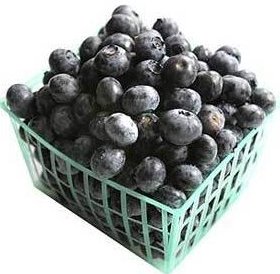From the Nutrition Tab lets learn about – Antioxidants and Free Radicals
A free radical is an unstable molecule. If you can remember from your high school chemistry an unstable molecule will seek to gain an electron from a weaker stable molecule in order to satisfy its need to become stable. This is known as oxidation. WiseGeek has it defined as “the loss of at least one electron when two or more substances interact. Those substances may or may not include oxygen.” In doing so, this free radical destabilizes the stable molecule and creates another free radical in a chain reaction of cellular destruction.
This process isn’t good for our bodies. When we are young our body has a greater ability to fight the “free radical” attack, but as we age, it can be overwhelmed by cancer causing free radicals and needs the help of Antioxidants.
Wikipedia defines an Antioxidant:
An antioxidant is a molecule capable of inhibiting the oxidation of other molecules. Oxidation is a chemical reaction that transfers electrons from a substance to an oxidizing agent. Oxidation reactions can produce free radicals. In turn, these radicals can start chain reactions. When the chain reaction occurs in a cell, it can cause damage or death. When the chain reaction occurs in a purified monomer, it produces a polymer resin, such as a plastic, a synthetic fiber, or an oil paint film. Antioxidants terminate these chain reactions by removing free radical intermediates, and inhibit other oxidation reactions. They do this by being oxidized themselves, so antioxidants are often reducing agents such as thiols, ascorbic acid or polyphenols.[1]
Although oxidation reactions are crucial for life, they can also be damaging; hence, plants and animals maintain complex systems of multiple types of antioxidants, such as glutathione, vitamin C, and vitamin E as well as enzymes such as catalase, superoxide dismutase and various peroxidases. Low levels of antioxidants, or inhibition of the antioxidant enzymes, cause oxidative stress and may damage or kill cells.[citation needed]
As oxidative stress appears to be an important part of many human diseases, the use of antioxidants in pharmacology is intensively studied, particularly as treatments for stroke and neurodegenerative diseases. However, it is unknown whether oxidative stress is the cause or the consequence of disease.
Antioxidants are widely used as ingredients in dietary supplements and have been investigated for the prevention of diseases such as cancer, coronary heart disease and even altitude sickness. Although initial studies suggested that antioxidant supplements might promote health, later large clinical trials did not detect any benefit and suggested instead that excess supplementation is harmful.[2][3] In addition to these uses of natural antioxidants in medicine, these compounds have many industrial uses, such as preservatives in food and cosmetics and preventing the degradation of rubber and gasoline.
Free radicals attack us from many different environmental sources every day. Some of which are: alcohol, tobacco, prescription drugs, smoked and barbecued food, harmful chemicals and additives in the foods we eat, sun bathing and pollutants in the air we breath. They assault your cells, large enzyme complexes, Vitamin C, and DNA. After age 28, the major source of aging is the production of free radicals. And with age, the amount of free radicals we produce increases. Scientists have determined that very large amounts of free radicals accumulated in your body, may significantly shorten your life span.
THE IMPORTANCE OF ANTIOXIDANTS!
Free radical fighters found in a certain group of nutrients, namely antioxidants, can help protect against a great many free radical initiated diseases. Antioxidants remove free radicals.
It is also believed that antioxidants also stimulate the immune system’s response to help fight existing diseases.
via Benefits of Antioxidants Protect Immune System Antioxidant Formulas.
The following is a list of what WebMD considers the top 20 antioxidant food sources:
Here’s the list of the top 20 food sources of antioxidants, based on their total antioxidant capacity per serving size:
Rank |
Food item |
Serving size |
Total antioxidant capacity per serving size |
||||||||||||||||||||||||||||||||||||||||||||||||||||||||||||||||||||||||||||||||||||||||||||||||
|
1 |
Small Red Bean (dried) |
Half cup |
13727 |
||||||||||||||||||||||||||||||||||||||||||||||||||||||||||||||||||||||||||||||||||||||||||||||||
|
2 |
Wild blueberry |
1 cup |
13427 |
||||||||||||||||||||||||||||||||||||||||||||||||||||||||||||||||||||||||||||||||||||||||||||||||
|
3 |
Red kidney bean (dried) |
Half cup |
13259 |
||||||||||||||||||||||||||||||||||||||||||||||||||||||||||||||||||||||||||||||||||||||||||||||||
|
4 |
Pinto bean |
Half cup |
11864 |
||||||||||||||||||||||||||||||||||||||||||||||||||||||||||||||||||||||||||||||||||||||||||||||||
|
5 |
Blueberry (cultivated) |
1 cup |
9019 |
||||||||||||||||||||||||||||||||||||||||||||||||||||||||||||||||||||||||||||||||||||||||||||||||
|
6 |
Cranberry |
1 cup (whole) |
8983 |
||||||||||||||||||||||||||||||||||||||||||||||||||||||||||||||||||||||||||||||||||||||||||||||||
|
7 |
Artichoke (cooked) |
1 cup (hearts) |
7904 |
||||||||||||||||||||||||||||||||||||||||||||||||||||||||||||||||||||||||||||||||||||||||||||||||
|
8 |
Blackberry |
1 cup |
7701 |
||||||||||||||||||||||||||||||||||||||||||||||||||||||||||||||||||||||||||||||||||||||||||||||||
|
9 |
Dried Prune |
Half cup |
7291 |
||||||||||||||||||||||||||||||||||||||||||||||||||||||||||||||||||||||||||||||||||||||||||||||||
|
10 |
Raspberry |
1 cup |
6058 |
||||||||||||||||||||||||||||||||||||||||||||||||||||||||||||||||||||||||||||||||||||||||||||||||
|
11 |
Strawberry |
1 cup |
5938 |
||||||||||||||||||||||||||||||||||||||||||||||||||||||||||||||||||||||||||||||||||||||||||||||||
|
12 |
Red Delicious apple |
One |
5900 |
||||||||||||||||||||||||||||||||||||||||||||||||||||||||||||||||||||||||||||||||||||||||||||||||
|
13 |
Granny Smith apple |
One |
5381 |
||||||||||||||||||||||||||||||||||||||||||||||||||||||||||||||||||||||||||||||||||||||||||||||||
|
14 |
Pecan |
1 ounce |
5095 |
||||||||||||||||||||||||||||||||||||||||||||||||||||||||||||||||||||||||||||||||||||||||||||||||
|
15 |
Sweet cherry |
1 cup |
4873 |
||||||||||||||||||||||||||||||||||||||||||||||||||||||||||||||||||||||||||||||||||||||||||||||||
|
16 |
Black plum |
One |
4844 |
||||||||||||||||||||||||||||||||||||||||||||||||||||||||||||||||||||||||||||||||||||||||||||||||
|
17 |
Russet potato (cooked) |
One |
4649 |
||||||||||||||||||||||||||||||||||||||||||||||||||||||||||||||||||||||||||||||||||||||||||||||||
|
18 |
Black bean (dried) |
Half cup |
4181 |
||||||||||||||||||||||||||||||||||||||||||||||||||||||||||||||||||||||||||||||||||||||||||||||||
|
19 |
Plum |
One |
4118 |
||||||||||||||||||||||||||||||||||||||||||||||||||||||||||||||||||||||||||||||||||||||||||||||||
|
20 |
Gala apple |
One |
3903 |
||||||||||||||||||||||||||||||||||||||||||||||||||||||||||||||||||||||||||||||||||||||||||||||||
Researchers also found that cooking method also had a significant effect on the antioxidant content of the foods tested, but those effects were not consistent.
For example, cooked Russet and red potatoes had much lower antioxidant levels than those found in raw potatoes. Boiling also decreased antioxidant levels in carrots, but cooking tomatoes increased their antioxidant content.
Supplements
Ok, I think we can agree that antioxidants are a good thing, so should we use supplements to get more of them? If so, then which ones and how much?
Keep in mind that many vitamins only work well in conjunction with other vitamins. An example is vitamin C and E. Vitamin C helps restore Vitamin E to active form.
Vitamin A is a “fat-soluble” vitamin, meaning that it is oily and won’t dissolve in water. The good news about Vitamin A is that it is stored in the fat (oil) of our body and is used over a longer time than a water soluble vitamin such as Vitamin C.
Vitamin C is water soluble and therefore is carried by the blood but as such must be replenished daily.
Vitamin E is also fat soluble. It helps protect the cell membranes. It is a strong antioxidant.
These three vitamins are important to our health and can be found in many foods. It is possible when eating a healthy balanced diet to get 100% of the vitamins we need in our food. But, if you believe your diet is falling short, a simple daily vitamin pill containing at least, A,C and E would be helpful.
Farm On you Fat Farmers,
Jughandle



5 comments
Your post on antioxidants is outstanding. This is very helpful information. Keep up the great posts!
[…] How to Subscribe ← NUTRITION: Antioxidants- What are they and do they really help? […]
[…] tomatoes- Tomatoes are our most common source of lycopene, an antioxidant that may protect against heart disease and breast cancer. The only problem with tomatoes is that we […]
[…] extracts from cucumbers have recently been show to have both antioxidant and anti-inflammatory properties. While research in this area must still be considered […]
[…] nitrate (saltpeter) which is a preservative in food and sodium ascorbate which is used as an antioxidant and is added to antacids and […]